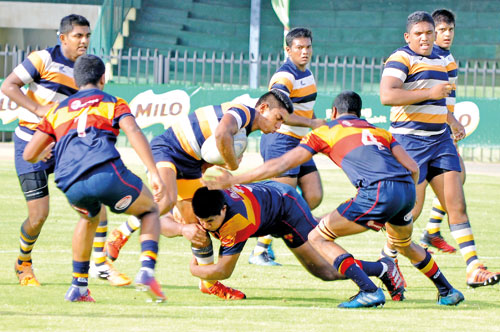Did the Lions lose the will to win?
View(s):
What Trinity had to go through the Schools Rugby season and at the Bradby Shield was totally unexpected - File pic
The Schools Knockout Quarter-finals were an interesting contest of mistakes. Were they mistakes or, the result of a long drawn, tiresome season? One may argue that a season for age grade Rugby in the RFU spans from September to May. This, however, has to be looked at from a point of grueling competition, climate, as well as those playing out of the age group. With breaks in between, one may have expected better recovery and be fit to battle.
It appears that, it does not seem so, as on-field injuries are more during any given match. From here, probably, the schools will play a more demanding ’7s’ tournament. World Rugby, in the interest of player welfare, has limited a final to a seven-and-a-half from the previous practice of 10 minute, as studies reveal more injuries during the second half.
The Sports Ministry and the Education Ministry should work with the Sports Medicine Unit to study the injury patterns and plan a season accordingly. It cannot happen in a day or two, but needs a long study.
Two weeks after the league, a knock out is on progress. League champs Royal opted out of the tournament, leading to 8th placed Dharamaraja getting a place in the semifinal. What if the draw was different when Royal decided not to play? which is what most people ask; but, what should be more important is to study the pattern that is more suitable in the present climate. Some do say the breaks in between the season took its toll. Is this evidenced by studies and observation or, just talk, resulting from conversation and not scientific?
The games in the quarter-finals saw attempts by some teams to effect turnover but, at times, blown to frustration. The play is so unstructured that make bodies hang or fall around impeding a good platform for better ball. The one point win by the Green Machine over St. Anthony’s Kandy was anybody’s game decided in the dying minutes. Both teams had poor options executed and or, selfish play that prevented the game being more electrifying, than being one that proved exciting because of the score line. The stadium may not be in the mindset of a Rugby community, but the crowds that mattered were there. Some in the crowd commented on the era when the Sugathadasa Stadium was filled when President’s Trophy matches were played. Club matches were under floodlights, while school matches preceded the Club game. The caged atmosphere may not be the best as some said.
However, it seems better when spectators cannot run into the field, after or during a match. With a lot self appointed protectors of school virginity around, the stadium helps. I was taken up by the comments of a onetime big shout who told some spectators to grow up and not disgrace the school. I saw pictures being taken, which I was told are used to drive sense to people who need sane counseling. But then, what can be done when new protectors join from the sides.
The passion and the binding with a school, made Rugby accepted and cheered. A far better following than those who witnessed the Club sevens. Sevens would normally cheer and madden crowds more than a 15-a-side game. The school still comes first, hence, probably, the better attendance was at the stadium. In contrast to the high ticket cost during the schools league, the prices charged by the Schools Rugby Union was moderate.
While League champions Royal opted out, a reluctant Trinity bowed out in the quarters. The crowds were rapturous, mostly because of the passion they have. The passion keeps the game alive. The minus is when the passion makes people blind to reality, and assumes that their prayer should be violence, even to the extent of threatening opposition supporters, which is ultimately left on the field. So far, it is left on the field but sad, it seems, when there is a tendency to pursue elsewhere.
 The first match was won by St. Joseph’s, as Wesley lost their way, having taken an early lead. The option to kick up-and-down prevented more running which came in sporadic moves. Wesley, who have been normally playing well in the second half, failed, and were forced out. The difference in the kicking was that, the Joes had follow through support, which Wesley did not. This was good enough for a win.
The first match was won by St. Joseph’s, as Wesley lost their way, having taken an early lead. The option to kick up-and-down prevented more running which came in sporadic moves. Wesley, who have been normally playing well in the second half, failed, and were forced out. The difference in the kicking was that, the Joes had follow through support, which Wesley did not. This was good enough for a win.
Reluctant Trinity was less of a challenge to St. Peter’s, who had the advantage of having won the League game. I would say, being schoolboys, the Lions did not have the mental strength, being unenthusiastic participants: having lost the League and the Bradby Shield which were within range. Probably, the weight was too much on their head. The Petes, as has been during the season, proved they are good when they are good. With less kicking from the No.10, there was more running by the backs? Trinity, on the other hand, went on with the centers breaking at the middle, but could not get the better out of the moves, as the defense nailed them.
The Isipathana vs St. Anthony’s match was one that raised the speed and contraction of the heart. The shouting was hoarse and comments hilarious, and vituperative at times. At the end, other than the few who remained, the crowds disbursed chanting the usual litany. For those who remained shouting by the gate to the ground: the problem was that the ground security closed the gate and hence, they could not run to the ground? There are many who love to run in at the end, to tell something to the referee, talk to the coach or pat players on the back. That is the thrill they have, but is it the requirement of the day? This was a game that could have been won by either side with ease. But a lot of selfish play, bad ball handling made it a difficult game.
The proof of the pudding will be in the eating. The effect of open gates will be best seen at the finals to be played on the Racecourse ground.
Vimal Perera is a former Rugby Referee, coach and Accredited
Referees Evaluator IRBÂ


